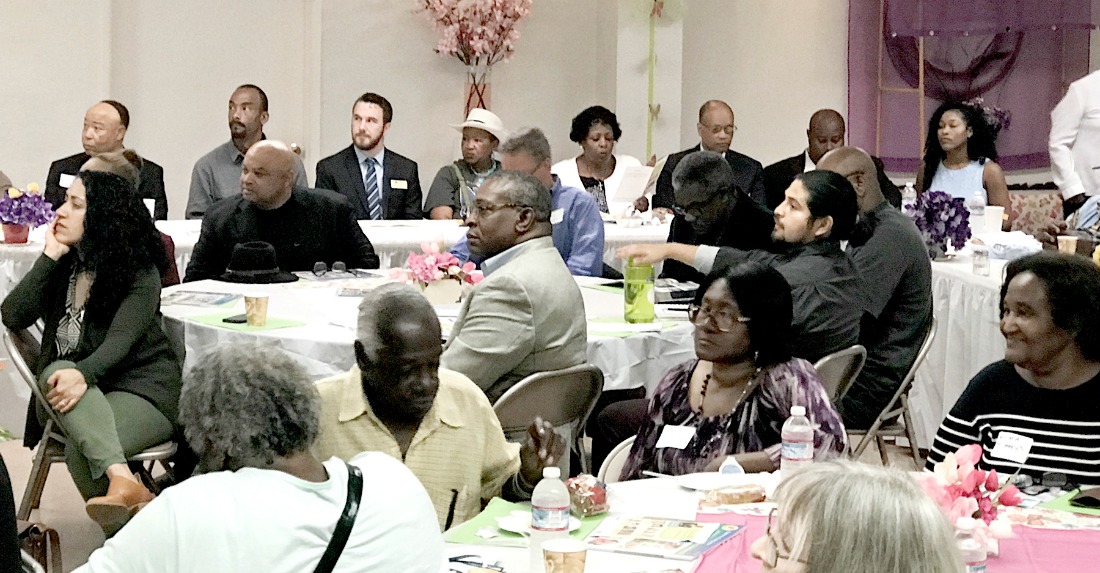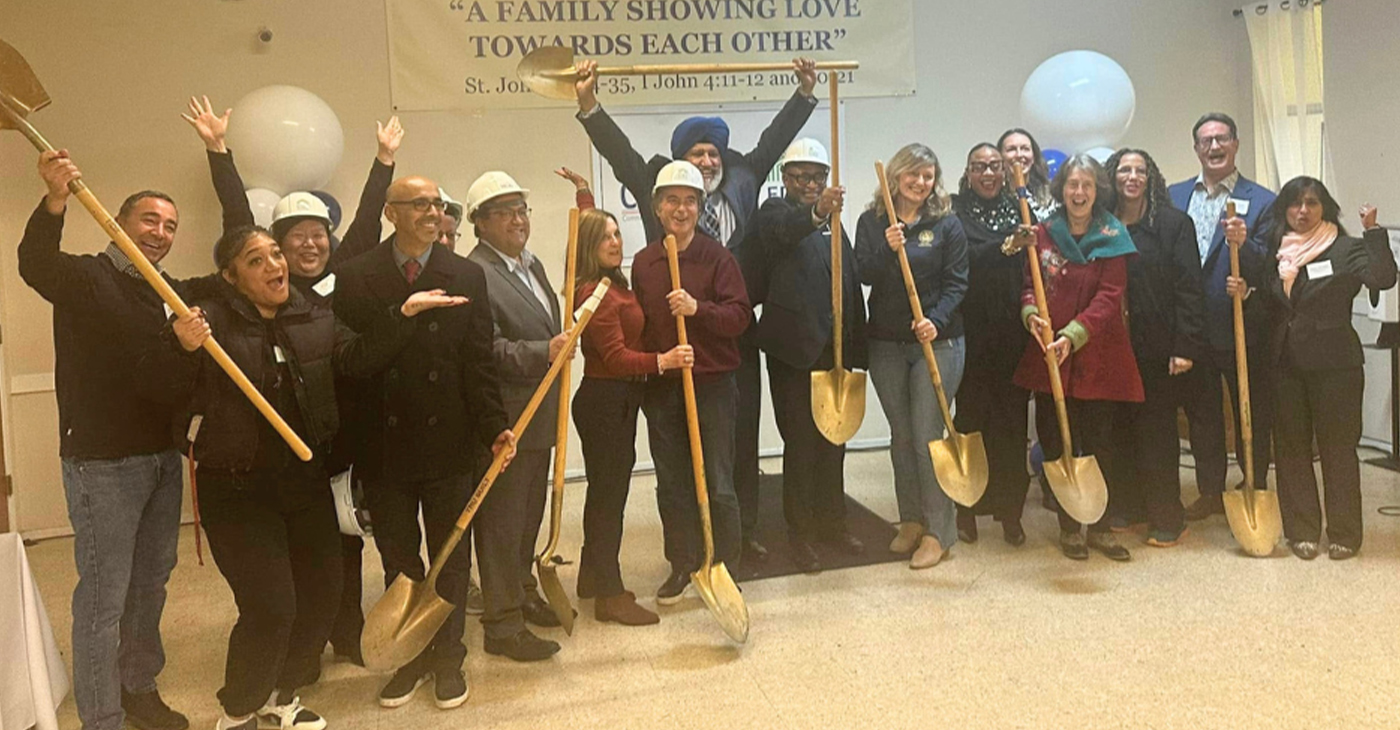Housing
Over 150 Attend Interfaith Affordable Housing Luncheon on Warriors Parade Day

caption: The Interfaith Affordable Housing Luncheon hosted by ‘Millennial’ Pastor Kenneth Anderson on June 15, was attended by over 150 pastors, developers, government officials and individuals interested in affordable housing in Oakland. Celebrating the Warriors started after the forum! Photo by Sue Taylor.
Underscoring the importance and the dire emergency of finding affordable housing while 1.5 million people gathered in Oakland to celebrate the Warriors, over 150 people kept their reservations and attended the Interfaith Affordable Housing Luncheon panel discussion and networking on development held at Williams Chapel Baptist Church, the brainchild of the Rev. Dr. Kenneth Anderson.
“We’re here to achieve the desired goal of faith-based leaders to partner with developers, attorneys, and architects to provide more affordable housing in Oakland,” said Dr. Anderson, Oakland’s “Millennial” pastor in his opening remarks.
Dr. Anderson, who leads Williams Chapel Baptist, is well under way on a development project on church land – 88 units of senior affordable housing, with parking, ground level retail and a medical clinic – currently the only senior affordable development in Oakland.
But he also wants to bring together other faith-based organizations to do the same and to share the necessary expertise.
Panel presentations included: “Financial Resources: What May Our Community Contribute?” by Michelle Myles-Chambers, of the SF Foundation, Oakland Housing Director Michele Byrd, and Linda Gardner, Director of Alameda County Community Development Agency were the presenters. These officials are key to accessing necessary funding for affordable housing projects.
In another panel, “Where the Rubber Meets the Road: The Developers,” developers with proven track records in affordable housing development made presentations.
Dr. Anderson unequivocally endorsed the panel for Oakland, which is experiencing a frenzy of development right now given the high cost of housing.
“These developers put people over profits,” he said,

The Financial Resources panel, from left to right: SF Foundation FAITHS Program Manager Michelle Myles-Chambers, Oakland Housing Director Michele Byrd speaking, and Director Linda Gardner, Alameda County Development, along with Host Pastor Dr. Kenneth Anderson, at the Interfaith Affordable Housing Luncheon on June 15, at Williams Chapel Baptist Church. Photo by Sue Taylor.
Gloria Bruce, executive director of the East Bay Housing Organization (EBHO) moderated the panel, which included Don Stump, president and CEO of Christian Church Homes with 12 properties in Oakland; Ancel Romero, president of Beacon Communities, Inc., and the developer for the Williams Chapel Project; and, Joshua Simon, executive director of the East Bay Asian Local Development Corporation (EBALDC).
The event emphasized that faith-based organizations own plenty of property in the SF Bay Area, but affordable housing development takes expertise and time, and shared efforts make sense.
Attendees wanted to know when Measure KK and Measure A1 funds would be available.
“We are developing policy and procedure as fast as we can,” said Alameda County’s Linda Gardner.
Oakland’s Director of Housing Michele Byrd, when pushed by Post publisher Paul Cobb, said individuals and groups can “call me directly.”
“We will be giving classes for first-time homebuyers, and I’m willing to talk with ministers on this. Let’s call it a constructive form of ‘speed-dating’,” she said.
This article is part of a continuing series on Bay Area faith-based affordable housing development.
Activism
Port of Oakland to Host January Meeting for Interfaith Council of Alameda County
State, county, and city officials have been invited to join ICAC board members and the community to explore effective strategies for addressing these interconnected challenges across Alameda County, including ICAC’s Safe Car Park program expansion and efforts to convert trailers into shelter for the unhoused.

Special to The Post
The Interfaith Council of Alameda County (ICAC) will hold its first meeting of 2025 on Thursday, Jan. 9, at the Port of Oakland, located at 530 Water St. Hosted by the president of the Port of Oakland, the meeting will run from 1-2:30 p.m. and will focus on pressing community issues including environmental justice, housing solutions, and crime and safety.
State, county, and city officials have been invited to join ICAC board members and the community to explore effective strategies for addressing these interconnected challenges across Alameda County, including ICAC’s Safe Car Park program expansion and efforts to convert trailers into shelter for the unhoused.
All are welcome and encouraged to attend and contribute to this important discussion. For more information, visit interfaithAC.org.
Activism
Groundbreaking of Legacy Court to Bring Affordable Housing to North Richmond
A Dec. 16 ceremony marked the groundbreaking for the development, which will offer affordable housing to 42 low-income households earning between 30% to 60% of the area’s average income, as well as 13 units for “residents experiencing homelessness, those at risk of homelessness and individuals in need of mental health services,” the partners said in a statement. The development will be located at 1267 Fred Jackson Way in North Richmond.

By Kathy Chouteau, The Richmond Standard
Community Housing Development Corporation (CHDC) and Eden Housing recently celebrated the groundbreaking of Legacy Court, a development that will bring affordable housing to North Richmond for low-income households and those experiencing homelessness.
A Dec. 16 ceremony marked the groundbreaking for the development, which will offer affordable housing to 42 low-income households earning between 30% to 60% of the area’s average income, as well as 13 units for “residents experiencing homelessness, those at risk of homelessness and individuals in need of mental health services,” the partners said in a statement. The development will be located at 1267 Fred Jackson Way in North Richmond.
Residents will have access to a variety of amenities such as a community room, community kitchen, laundry facilities, computer lab with high-speed internet and bike parking. Legacy Court will also be wholly electric with energy-efficient appliances and other green elements, with the aim of reducing the project’s carbon footprint.
Residents needing mental health services and related support will have access to Contra Costa Behavioral Health Services on-site.
Activism
OPINION: Solutions to the Housing Crisis Exist, but Governments Waste Tax Dollars Instead
People who are homeless want real housing, not temporary shelters that are dangerous and crowded. The City of Oakland has been telling the public that the sweeps of encampments are an effective solution, but it just pushes people from block to block, wasting tax money on paying police officers overtime in a budget crisis. This is true at the state level too, where California spends $42,000 per person that is unhoused per year. The city and state could just help pay residents’ rent, rather than pay for police to harass people on the streets, many of whom have disabilities or are elders.

By Kimberly King and Victoria King
In a powerful demonstration of grassroots organizing, activists joined forces in direct action that started on Dec. 17 to call for the establishment of sanctuary communities across the West Coast
The goal of the effort is to raise awareness about misleading narratives around homelessness and to present concrete solutions to a crisis that leaves over 35,000 people unsheltered each night in the Bay Area.
The action, led by members of Oakland’s Wood Street Commons and Homefullness/Poor Magazine, represents a direct response to the U.S. Supreme Court and Gov. Gavin Newsom’s approach to homelessness. At the core of the movement is a fundamental truth: housing is a human right, not a commodity to be bought and sold for profit.
People who are homeless want real housing, not temporary shelters that are dangerous and crowded. The City of Oakland has been telling the public that the sweeps of encampments are an effective solution, but it just pushes people from block to block, wasting tax money on paying police officers overtime in a budget crisis. This is true at the state level too, where California spends $42,000 per person that is unhoused per year. The city and state could just help pay residents’ rent, rather than pay for police to harass people on the streets, many of whom have disabilities or are elders.
The coalition of organizations, led by people with lived experience of homelessness, coordinated their efforts to show the unity behind this movement, including setting up sweeps-free sanctuary communities and resource centers and presenting solutions to city council. The message is clear: unhoused residents refuse to remain invisible in the face of policies that have resulted in 347 deaths for people experiencing homelessness in Alameda County just this year alone.
The coalition presented four key demands, each addressing different aspects of the housing crisis. First, they called for the establishment of sanctuary communities instead of sweeps, urging the redirection of encampment management funds toward positive solutions like encampment upgrades and permanent low to no-income housing.
The second demand focuses on utilizing public land for public good, specifically identifying vacant properties like the Hilton Hotel on Port of Oakland land. The coalition emphasized the immediate availability of these spaces to house hundreds of currently unhoused residents.
Prevention forms the third pillar of the coalition’s demands, with calls for strengthened renter’s rights, rent subsidies, and a permanent moratorium on rental evictions and foreclosures for non-payment.
Finally, the coalition demands the defunding of coercive “Care Courts,” advocating instead for non-carceral approaches to mental health care and harm reduction.
The Poor People’s Campaign’s motto, “When we lift from the bottom, no one gets left behind,” encapsulates the spirit of the action. Daily activities, including opening prayers for those who have died while homeless, served as powerful reminders of the human cost of failed housing policies that treat housing as a commodity rather than a fundamental right.
As this crisis continues to unfold, these activist groups have made it clear that the solution to homelessness must come from those most directly affected by it.
About the Authors
Kimberly King and Victoria King are Oakland Residents who advocate for the unhoused and propose solutions to end homelessness and housing insecurity.
-

 Activism3 weeks ago
Activism3 weeks agoBooks for Ghana
-

 Arts and Culture4 weeks ago
Arts and Culture4 weeks agoPromise Marks Performs Songs of Etta James in One-Woman Show, “A Sunday Kind of Love” at the Black Repertory Theater in Berkeley
-

 Bay Area3 weeks ago
Bay Area3 weeks agoGlydways Breaking Ground on 14-Acre Demonstration Facility at Hilltop Mall
-

 Activism4 weeks ago
Activism4 weeks ago‘Donald Trump Is Not a God:’ Rep. Bennie Thompson Blasts Trump’s Call to Jail Him
-

 Activism3 weeks ago
Activism3 weeks agoLiving His Legacy: The Late Oscar Wright’s “Village” Vows to Inherit Activist’s Commitment to Education
-

 Arts and Culture3 weeks ago
Arts and Culture3 weeks agoIn ‘Affrilachia: Testimonies,’ Puts Blacks in Appalacia on the Map
-

 Alameda County3 weeks ago
Alameda County3 weeks agoAC Transit Holiday Bus Offering Free Rides Since 1963
-

 #NNPA BlackPress4 weeks ago
#NNPA BlackPress4 weeks agoCalifornia, Districts Try to Recruit and Retain Black Teachers; Advocates Say More Should Be Done


















































